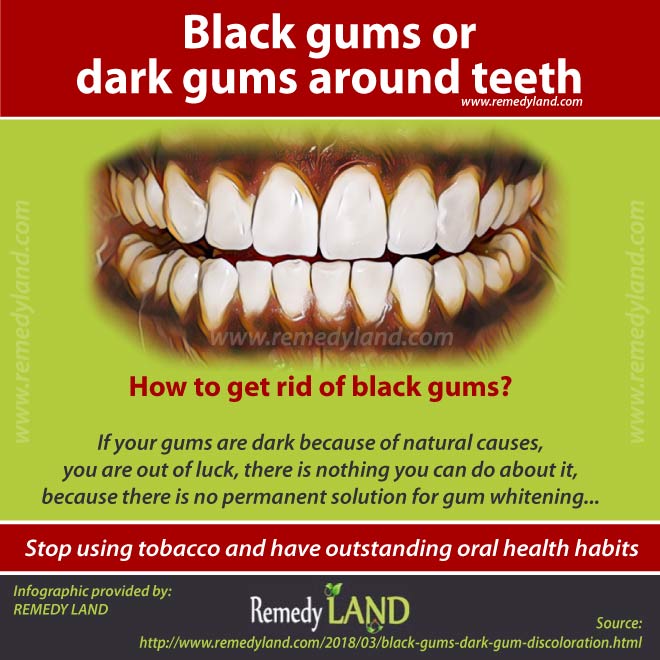Gum discoloration can be sign of serious health problems and must be addressed immediately. Healthy gums have a pink color but can be also brown, depending on ethnicity or aging. Gums turning black suddenly might be due to certain medications or periodontal diseases. To learn what causes black gums and how to treat dark gums, keep reading!
Page Contents
Why are my gums black?
The natural reason behind discoloration of gums is melanin, the black pigment responsible for skin darkening. People who don’t have naturally dark gums, may have discolored gums because of presence of sunlight. Too much sun exposure is going to boost production of melanin and people who are involved in prolonged outdoor activities may acquire dark gums.
What diseases and conditions can cause black gums?
Let’s talk about gum discoloration caused by serious health problems. If your gums are suddenly turning black you might have the fallowing health problems: acute necrotizing periodontal disease, calculus, oral malignant melanoma, Addison’s disease, gingival cancer or Peutz Jeghers syndrome.

Acute necrotizing periodontal disease can cause black gums
This dangerous form of gum disease is characterized by gingival necrosis, which means a death of gum tissue. The major forms of this disease, ulcerative gingivitis and ulcerative periodontitis, can cause black gums. They are usually consequence of poor oral hygiene. Those aggressive forms of gum disease must be treated and prevented from recurrence. One of the differences between them is area on which they occur. Ulcerative gingivitis is affecting only the gums and ulcerative periodontitis is affecting tissue that surrounds the teeth.
Discoloration of gums caused by calculus
Plaque that is not removed is going to harden and create tartar also known as calculus. Over time it is going to build up underneath your gum line and create dark gums. Calculus can’t be removed by toothbrush, to remove it you must visit a dentist.
Black spots on gums due to oral malignant melanoma
This rare type of mucosal melanoma occurs usually in the maxillary gingiva. One of the signs of oral malignant melanoma are black spots on your gums. Patients with oral malignant melanoma usually recall having black spots on gums months before diagnosis. Therefore, if you see those black spots on your gums please visit your doctor immediately.
Dark gums induced by Addison’s disease
Adrenal insufficiency is a rare endocrine disorder characterized by abdominal pain, muscle weakness, low blood pressure, weight loss and sometimes darkening of the gums due to an increase in melanin pigmentation.
Gum turning black because of gingival cancer
Gum cancer is an uncommon condition in which cancer cells start to grow uncontrollable on the gums. Symptoms of gingival cancer look like various lesions of the oral cavity and patient often neglect those symptoms. Gingival cancer is easily treatable if it is diagnosed in the early stages.
Black spots on gums caused by Peutz–Jeghers syndrome
PJS is characterized by development of pigmented areas around the mouth and on the lips known as mucocutaneous hyperpigmentation. Those benign hamartomatous polyps sometimes appear on gums in a form of black spots.
Smoking causes black gums
Smoker’s melanosis is most often seen in people who use tobacco. The black pigmentation of gums is one of the symptoms of this oral condition. Those black spots can be also seen on inside of cheeks, other oral tissues and in larynx.
How to get rid of black gums?
If your gums are dark because of natural causes, you are out of luck, there is nothing you can do about it, because there is no permanent solution for gum whitening. But, if your gums are discolored due to health problems, the only thing you can do is to treat underlining disease. Also, you can stop using tobacco and have outstanding oral health habits.

